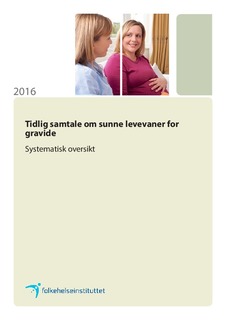| dc.description.abstract | Background
A pregnancy is a special phase for both the mother and the child. Pregnant women can promote health and prevent several adverse health outcomes through healthy lifestyle habits. Before the forthcoming revision of the Norwegian national guidelines for antenatal care, it is necessary to critically appraise the available evidence about the effects of counselling women earlier in their pregnancy than current practice.
Objective
This systematic review summarizes the effects of one counselling session about healthy lifestyles during the first trimester. The lifestyle factors emphasised are alcohol consumption, tobacco use, dietary habits and physical activity.
Method
We searched for primary studies in Cochrane Central Register of Controlled Trials (CENTRAL), MEDLINE, Embase, CINAHL and Swemed+ through November 2015, and checked the reference lists of included studies. Two people independently examined 6038 references, assessed 63 in full text and included two studies. The relevant study population was pregnant women without any known health problems at the study onset. The intervention was one counselling session in the first trimester about healthy lifestyle habits in addition to standard antenatal care. Control was standard antenatal care. Studies with repeated counselling sessions about healthy lifestyle habits that started in the first trimester were excluded, but are presented in an appendix. We looked for randomized controlled trials, non-randomized controlled trials, interrupted time series, and cohort studies fulfilling specific criteria. Two reviewers independently assessed risk of bias using study design specific checklists. One person retrieved data from the studies, analysed and assessed our confidence in the effect estimates, and another person checked the data and analyses. We used the GRADE-methodology (Grading of Recommendations Assessment, Development, and Evaluation) to indicate our confidence in effect estimate. The confidence may be high, medium, low, or very low.
Results
We included two studies: One cluster randomized controlled trial from the UK with 2187 participants and one randomized controlled trial from the US with 1093 participants. One study recruited only smokers, while the other recruited both smokers and women who had stopped smoking quite recently. In both studies, women in the intervention group received one extra smoking cessation counselling session (10-15 minutes) during the first trimester, in addition to standard antenatal care. The control groups received standard antenatal care, which included basic smoking cessation advice. One of the studies reported that a proportion of the women in the control group unintentionally received additional smoking cessation counselling (contamination of the intervention). We considered that both studies have unclear risk of bias. We did not find studies with one counselling session about healthy lifestyles within the first trimester with a focus on alcohol consumption, dietary habits or physical activity.
Our confidence in the documentation of effect is low or very low. Seen overall, we found that the evidence is too uncertain to conclude whether one extra smoking cessation session within the first trimester alter the proportion of pregnant smokers who are abstinent women at birth and 6 months later. One extra smoking cessation session within the first trimester for recent ex-smokers may increase the proportion who are abstinent at birth (Relative risk 1.37; 95% Confidence interval 1.03-1.83). Evidence is lacking about possible effects of one counselling session about healthy lifestyles during the first trimester with a focus on alcohol consumption, dietary habits or physical activity.
Through the literature search, we found 14 trials where an early counselling session about healthy lifestyles was part of a program of repeated counselling sessions or combined with other measures in addition to standard antenatal care. These studies are presented in an appendix, but are not analysed as they answered a related, but different objective.
Discussion
This systematic review found insufficient evidence to answer the research question in an adequate way. We only found two relevant studies and both focused on smoking cessation and we have low or very confidence in the documentation of effect based on these. We can only partly estimate how large the likely effects of one counselling session about healthy lifestyles during the first trimester are. Low confidence in the evidence does not mean that the intervention is ineffective, but the data is too limited to reliably estimate the magnitude of the effect. A decision regarding whether pregnant women should be offered an early counselling session about healthy lifestyles during the first trimester will be made based on several considerations beyond the question of likely effect alone.
Conclusion
We found sparse evidence to estimate the effects of one counselling session about healthy lifestyles during the first trimester. One extra smoking cessation session within the first trimester for recent ex-smokers may increase the proportion who are abstinent at birth. We cannot conclude whether it changes the proportion of pregnant smokers who are abstinent at birth comparted to smokers who receive standard antenatal care. Evidence is lacking about whether one counselling session in the first trimester can influence alcohol consumption, dietary habits or physical activity. | |
